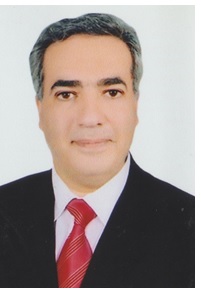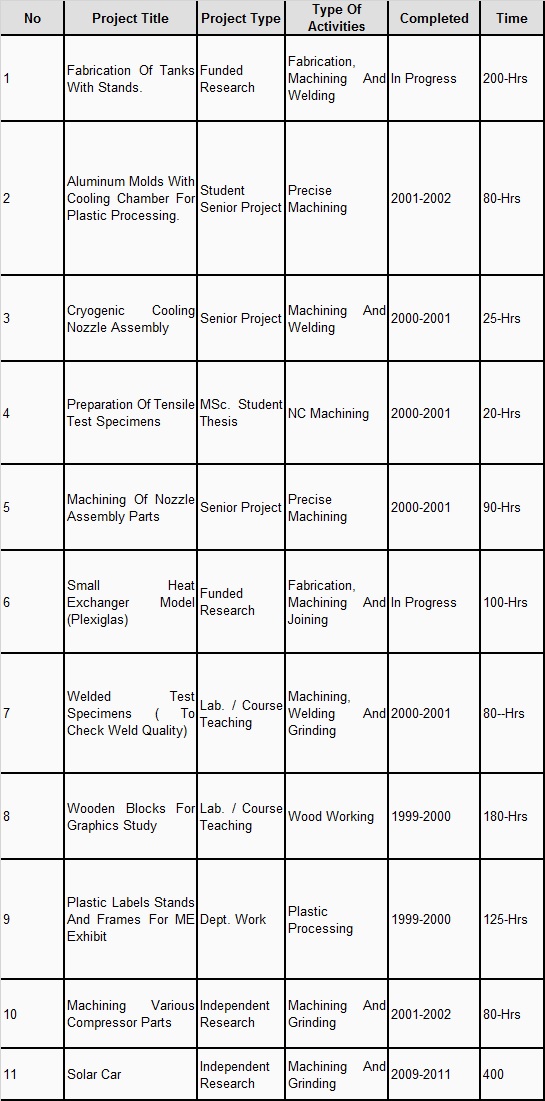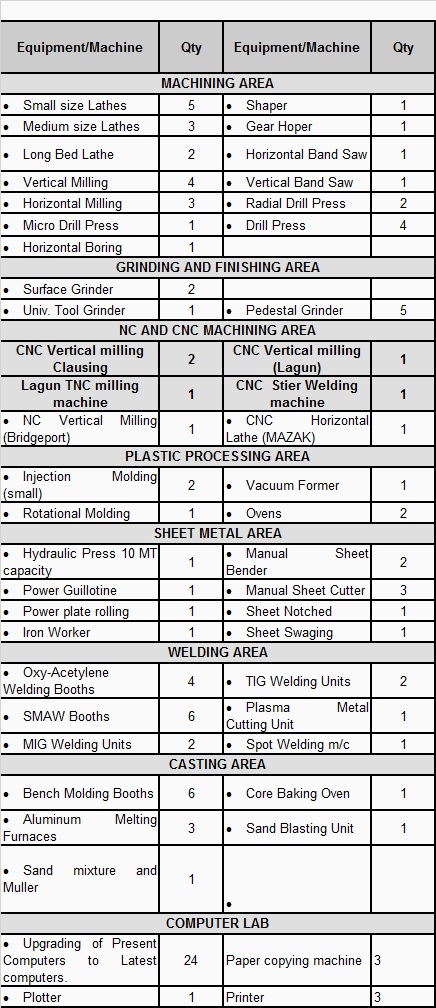ME WorkshopWorkshop Director

Dr. Ahmed Aly Diaa Sarhan
Introduction to the Lab
Traditional role of a Mechanical Engineering (ME) Workshop in an educational institute
is to provide students a plan where they learn and practice various fabricating techniques. In an organized manner, this learning is integrated as a part of their manufacturing courses. The workshop provides a chance to appreciate a variety of manufacturing activities needed in making a product. It provides support for manufacturing students and faculty projects and assists the various other laboratories to produce test specimens, clamps, fixtures etc. In a research environment it provides support to manufacture precise and intricate parts and prototypes. The technicians of a workshop should have ability to interface with faculty and students in their research activities and satisfies them in terms of fabricating their desired design products or prepare setup for experiments in a timely fashion.
ME Workshop at KFUPM
The Mechanical Engineering (ME) workshop at KFUPM was established in 1966 with the limited resources and facilities of welding and conventional machining. The ME workshop at that time had a limited goal of providing the lab teaching support for two basic manufacturing technology courses and manufacturing related support for some faculty research projects in the department. The persons responsible for the workshop at that time were primarily trained and oriented on the pattern of running a conventional machine shop. As the time passes advancement in technology have necessitated to modernize the workshop, but the historical baggage of previous years create the resistance to its growth and development. The demand of making parts from harder and stronger materials, fine and deep holes, intricate contours, dies and molds and precise manufacturing is growing in the workshop.
ME Workshop is located in building-1 and occupies a covered area of about 12,000 square ft. that include one large hall and four considerably large rooms plus adequate storage space for tools, consumables and materials etc. It is equipped with a wide variety of conventional and modern machine tools, materials processing equipment and instrumentation. It is used for both teaching and research programs in the manufacturing engineering area as well as providing service for the production of research facilities for the ME and other KFUPM departments.
The ME workshop consists of seven material processing labs, viz.,
Foundry & Casting
Welding
Conventional Machining
Sheet Metal Forming
Wood Working
Plastics Processing
Manufacturing Automation and CAD/CAM
In addition to the above facilities, the ME workshop has a design office equipped with a CAD station and a plotter. Also included is a CAD/CAM PC lab for computer-aided manufacturing and automation.
Courses supported are:
- ME 323
- ME 407
- ME 414
- ME 416
Design/Research Activities
The manufacturing related research projects received by ME workshop are categorized as follows:
- Course/labs Teaching Support
- Senior Design Projects (ME - 411/ME-412)
- M. Sc / PhD Thesis (ME-610/ME-710)
- Independent Research
- Funded Research
- Others Departmental Projects
Prior to initiating a formal project request the faculty member or student may discuss (if needed) the manufacturing aspects of the perceived project with the relevant technician or the shop supervisor. The Procedure to accomplish any manufacturing related research project in the ME Workshop is outlined below:
The originator of research project (faculty member or student advisor) is required to fill a "Project Requisition Form" (see Form-1) that is available with the shop supervisor and in the ME Department. The request form must accompany a proper working drawing with complete dimensions and all necessary information about materials and tolerances. The form is duly signed by the originator and submitted to Workshop Director, or through the Deputy Director. Workshop Director forwards this request to the project committee of the workshop for their input.
Project Committee evaluates the feasibility of the project and availability of materials and other resources. The committee may decide to have a discussion with originator for further clarification. Once it is determined by the committee that the project can be accomplished in the workshop, it is assigned a project number and scheduled on a first come and first serve basis in accordance with the priority of various activities as set in the role of Workshop.
In accordance with the schedule the project is assigned to relevant technician(s).
The technician(s) work out the materials requirements, the equipment, tooling, dies, fixture etc. and submit the request (see Form-2) to shop supervisor. The items available in inventory and store are issued where as for non-available items the necessary purchase requisitions are initiated.
During the project duration the technician(s) keep tracks the man-hours spend and discuss the project difficulties and progress with shop supervisor and/or the project originator through supervisor.
The workshop supervisor keep tracks of all projects and maintains the database in computer program named as "List of Projects Manufactured in ME workshop"
The technician(s) inform the shop supervisor about the completion of project and hand over all documents to supervisor along with the time spends on the project.
A list of some representative projects from various semesters done by ME workshop is tabulated in Table below

Equipment
Located In Building 1, The ME Workshop Supports The Design And Fabrication Needs For The College Of Mechanical Engineering In Particular And The Whole University In General. It Features A Full Machine Shop, Including NC/CNC Capabilities, Welding/Sheet Metal, Woodworking, Foundry And A Student Work Area.
Generally, The Shop Consists Of Two Parts, The Professional Shop And The Student Shop. The Student Portion Of The Shop Is Available To Mechanical Engineering Students Who Have Read And Understand The Safety Rules. The Shop Has A Number Of Engine Lathes And Vertical Mills Available For Student Use As Well As The Necessary Tools. The Shop Also Has Other Equipment That Can Be Used With Appropriate Permission And Instruction.
The Professional Portion Of The Shop Provides Services To The Faculty And Graduate Students Working On Research Projects. The Shop Also Produces The Specimens For The Materials Science Teaching Labs And Maintains Or Makes Special Equipment Needed For All Labs. The Shop Personnel Include Three Full Time Journeymen Machinists, Two Electronics Technicians, A Lab Manager Who Oversees The Undergraduate Laboratories, And A Stores Clerk
The ME Workshop Consists Of Seven Material Processing Labs, Viz.,
- Foundry
- Welding
- Machine Shop
- Sheet Metal Forming
- Carpentry
- Plastics Processing
- Numerical Control (NC/CNC) Machining
Equipment And Machine Tools
A Variety Of Equipment And Machine Tools With Their Respective Quantities In different Areas Of Manufacturing Are Tabulated In Table 1.
Instrumentations
- Dynamometers.
- Chart Recorder.
- Data Acquisition Software.
- Temperature Measurements Devices.
- Taylor Hobson Surtonic 10 Instrument.
- Various Electric Meters.
Tooling, Fixtures, Molds, Dies Etc.
- Basic Cutting Tools For Lathe, Milling, Drilling, Shaping, Sawing And Grinding.
- Molds And Dies For Extrusion, Forging, Sheet Metals And Plastic Molding
- Patterns For Sand Casting Processing.
- Various Hand Tools Such As Screwdrivers, Spanners, Hammer Etc.
- Marking, Punching And Others Hand Tools Etc.
- Indexing Devices, Mounting Clamps Collets And Fixtures Etc.
Materials And Consumables
- Mild Steel, Stainless Steel, Brass, Aluminum, Copper, Plexiglas And Wood Materials Sheets And Plates Of Various Commonly Use Thicknesses\
- Mild Steel, Stainless Steel, Aluminum And Brass Materials Structural Shapes.
- Some Mild Steel Commonly Used Valves And Fittings.
- Safety Equipments Such As, Goggles, Welding Gloves, Screen, First Aid Medicines.
- Bolts, Nuts, Washer And Other Fasteners Of Common Sizes.
- Welding Electrodes, Filler Rods And Spools, Fluxes, Paints, Green Sand, Coolant, Oils, Gas Cylinders Etc.
- Consumables, Spare Parts And Accessories

Experimnet